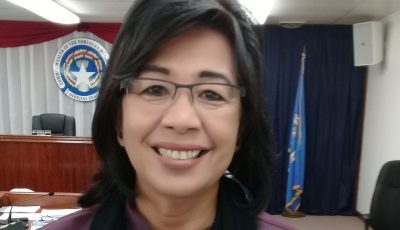Japanese govt, consulate disappointed with HJR 22-11
The Japanese government and its Consular Office of Japan on Saipan have both expressed disappointment with a House joint resolution introduced in the CNMI Legislature last week that condemned Japan’s decision to dump treated nuclear waste from the destroyed Fukushima nuclear plant into the Pacific Ocean.
In a news briefing last Friday, Consul Ono Kazuhiko, who leads the Japan consulate on Saipan, said that House Joint Resolution 22-11—which was introduced by House Natural Resources Committee chair Rep. Sheila J. Babauta (D-Saipan)—stems from a “misunderstanding” that Japan’s plan is to dispose of nuclear waste directly into the Pacific Ocean. He said what will be released into the Pacific Ocean is in fact “ALPS treated water.”
“ALPS treated water” is the byproduct of a process where radioactive materials in water are removed by an Advanced Liquid Processing System to meet regulatory standards for discharge, with the exception of tritium.
Japan announced in April this year a plan to start releasing in two years into the Pacific more than a million tons of treated wastewater from the Fukushima nuclear plant, which was destroyed in the 2011 Tohoku earthquake and tsunami.
During Friday’s press briefing, Ono said the International Atomic Energy Agency in July this year approved Japan’s plan to release ALPS treated water in a “safe and transparent way,” and said that IAEA experts will be closely monitoring and reviewing the release of treated water closely to ensure that it is “conducted safely” and “in line with international practices”
On the subject of leftover tritium in the treated water, Ono explained that tritium is very closely related to hydrogen, making it very difficult and almost impossible, using current technology, to separate it from water. According to an online definition, tritium is a rare and radioactive isotope of hydrogen.
Ono assured, though, that tritium exists naturally in rain, seawater, and tap water, and does not accumulate in the human body, as it is excreted together with water from the body. Ono added that according to a program used by Japan to simulate the diffusion of treated water into the Pacific Ocean, the concentration of tritium will be almost the same as the tritium level of natural seawater.
Using presentation slides, Ono shared that 1.25 million tons of treated water that Japan currently has in tanks—which is almost equivalent in volume to the Japanese baseball stadium, the Tokyo Dome—merely contains 15 grams, or about one tablespoon, of tritium.
Ono concluded Friday’s press briefing by saying that Japan and the CNMI have had a “close relationship and story dating back to 100 years ago.” He pointed out that on April 6, 2011, the CNMI Senate passed a resolution to show solidarity with Japan after the devastating Tohoku earthquake and tsunami on March 11, 2011. HJR 22-11, however, may strain the Japan-CNMI relationship, said Ono.
He added that the U.S. government itself has shown support for Japan’s plan to release treated water, and asked why the CNMI Legislature, with the CNMI being a U.S. territory, condemns Japan’s plans “regardless of support by the [the] U.S. government.”
Ono also asked why the House is raising an issue now, with the plan already scheduled to begin in a year and a half from now.
Finally, Ono also asked the House why Japan was singled out in particular. During the press briefing, Ono again pointed to presentation slides that showed— according to data compiled from the Japan Nuclear Energy Safety Organization, Korea Hydro & Nuclear Power, China Nuclear Energy Association, Taiwan Power Company, and other energy authorities in East Asia— that Japan produces below 22 TBq annually, compared to South Korea which produced about 122 TBq in 2019 and parts of China that produced between 87-124 TBq in 2019.
According to an online definition, Bq, or becquerel, is a unit of measurement for the quantity of radioactive material. In this case, TBq is a measurement of how much tritium is released.
“Why does the House Legislature only target and condemn Japan, regardless of being one of the countries that discharge the least amount of tritium contained [in] treated water?” asked Ono.

























